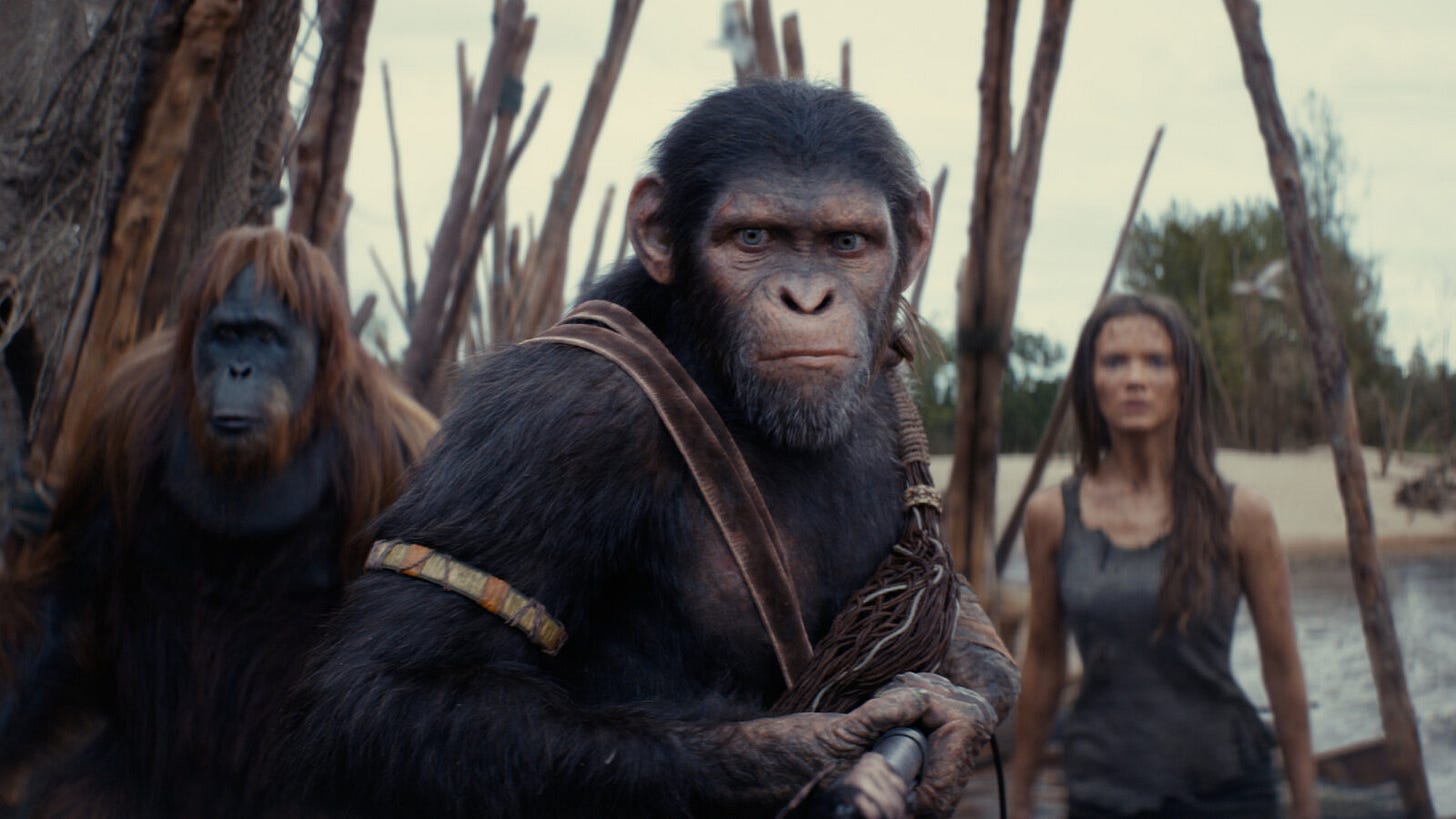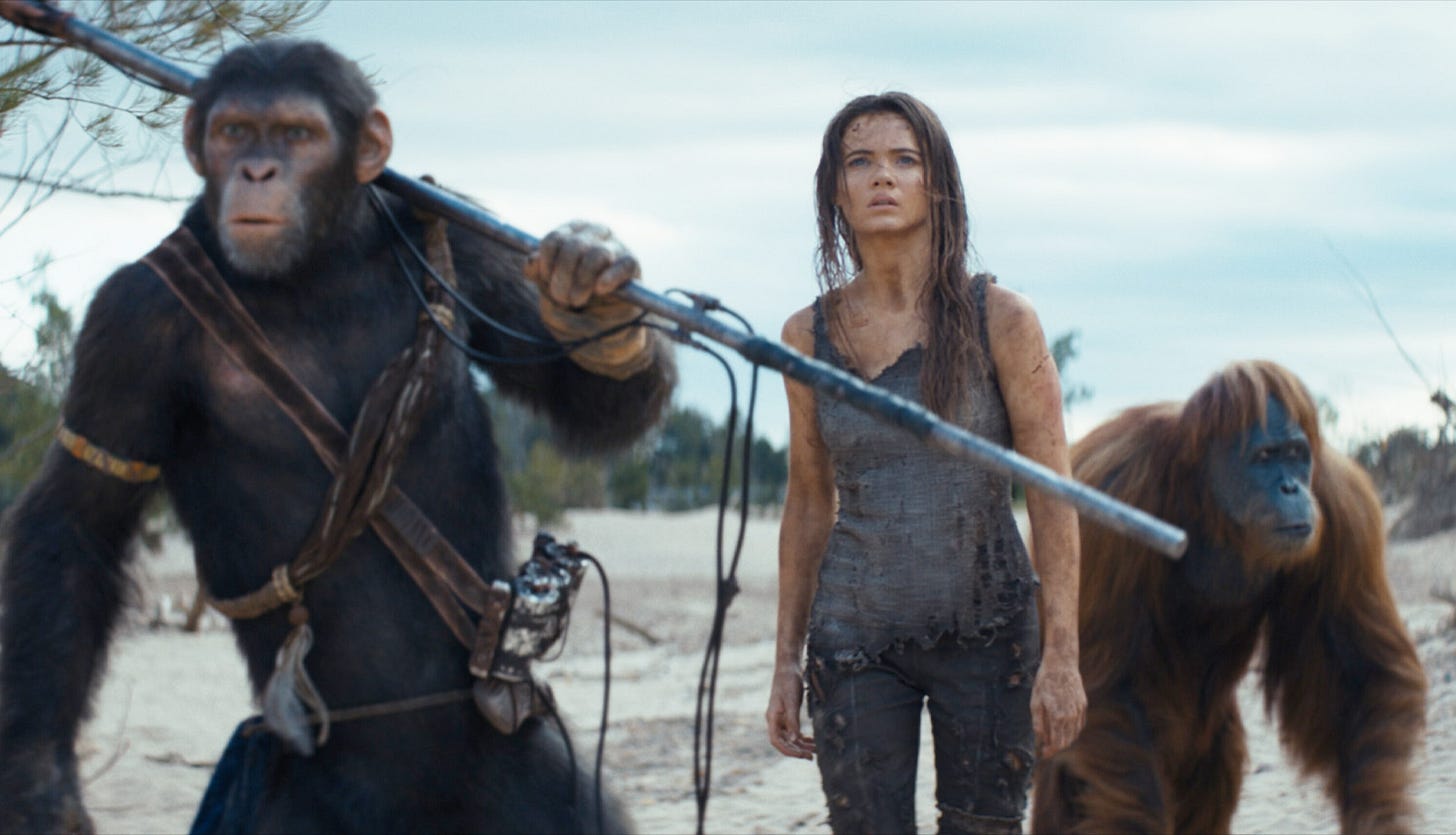The Kingdom of the Planet of the Apes Review: Lowered Expectations Help the Soft Reboot
Back to the apes again
Director: Wes Ball
Writers: Josh Friedman, Rick Jaffa, and Amanda Silver
Stars: Freya Allen, Kevin Durand, Dichen Lachman
Synopsis: Many years after the reign of Caesar, a young ape goes on a journey that will lead him to question everything he’s been taught about the past and make choices that will define a future for apes and humans alike.
The last trilogy of The Planet of the Apes, in cinephile circles, have an allure of unassailable greatness. They were better than anyone could have dreamed they would be when announced. And sure, the first one is significantly poorer than the duology directed by the stellar Matt Reeves, but they are all good-to-great. But when The Kingdom of the Planet of the Apes was set to release, many of us held our breath. Could Wes Ball, director of The Maze Runner manage to live up to the high standard?
The answer is no, not really, but that is not a complete negative. It feels like the writers of this film - Josh Friedman, Rick Jaffa, and Amanda Silver - felt this, as well. The decision to set this long after the end of the events in that particular trilogy is quite a clever gambit. Essentially, everything you know is dead and we have to find a way to start again.
This version focuses on Noa (Owen Teague), a young ape living in a world in which the apes are dominant. He is also the heir to his particular clan of apes, focusing on falconry. Noa is going through a coming-of-age ceremony, in which he must take an eagle’s egg and bring it back to his village. Unfortunately, his egg is cracked and he decides to go out on his own to find another. During this journey, he comes upon a terrifying scene featuring raiders with electric weapons. They track him back as he attempts to escape. By the time he arrives, sadly, his village is engulfed in flames. His original coming-of-age may have failed, but the journey he embarks on afterwards is not ceremonial, but a genuine path of growing up and understanding the real world, such as it is.
I would be remiss if I did not discuss the technological prowess of this movie. It is easy to discount because the bar for these films has always been quite high. Even the originals in the ‘60s and ‘70s were stunning for the time. The more recent trilogy is simply astounding. Much of that is due to not only the technology, but also the mo-cap actors putting in many long hours of dedicated craft. This version is no different. You could put this on mute and just watch and be stunned by the look of it. One could complain that the soft reboot never meets the heights of that trilogy, but it does inhabit the same world, one worth spending time in.
The Kingdom of the Planet of the Apes has a lot on its mind. A bildingsroman, the power and terror or religion, the twisting of power, political infighting, interspecies cooperation; really it has it all. One could argue that it is too much, overstuffed. There are likely three excellent movies wrapped up into one. The third act, which involves our villain, Proximus Caesar (Kevin Durand), stretches a bit too much. But Durand’s vocal and physical performance truly makes everything worth it in the end.
Yes, the ending may feel the slightest bit forced. The writing feels quite boxed into the corner of continuing this franchise as opposed to writing a story that has a logical ebb and flow to it. The human characters, if you can call them that, make little sense in their actions. As such, they feel more like a means to an end. This is where this film falls short of its predecessors. A strength these films have always had is an understanding of different points of view. Kingdom of the Planet of the Apes is much more straight forward, for better or worse.
This is basically only a good start. And maybe, considering the expectations put on franchise filmmaking these days, that’s fine. You care about the apes, you care about where it’s going, and hell, you care enough to keep watching. Good enough!
Grade - B-
*This was originally discussed on Pop Culture Case Study



